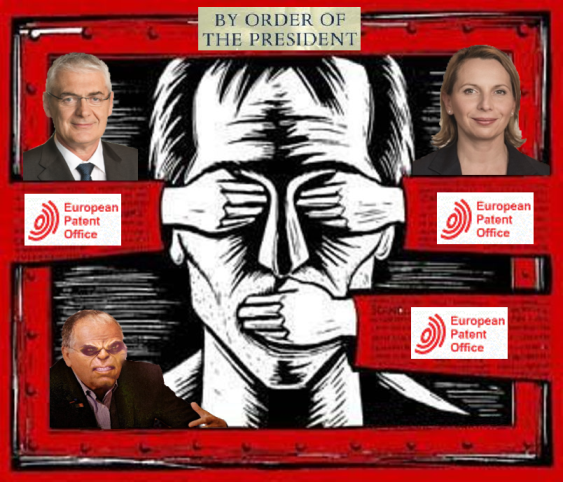

In Judgment No. 4551, the Tribunal found that "the true reason for the requirement of the prior authorisation was to exercise a prior censorship on the content of the communications."
The ILOAT Judgment which we will look at in this part - No. 4551 - concerns a challenge by a group of three staff representatives to measures adopted by EPO management in May 2013 (!) for the purpose of preventing EPO staff representatives from sending mass e-mails to staff.
"The Tribunal found that the restrictions imposed by the communiqué of 31 May 2013 were unlawful and breached the fundamental right to freedom of association."On 13 May 2013, Battistelli issued Communiqué No. 26 entitled “When enough is enough – the use of mass emails within the Office”. He complained that staff representatives were using mass emails increasingly, and claimed that, in many instances, these emails were polemical and factually incorrect.
Battistelli announced that he would shortly be setting up rules on mass communications and he delegated this task to his trusted "Croatian bulldog", the notorious union-buster Željko Topić.

On 30 May 2013, Battistelli’s "Croatian bulldog", the notorious union-buster Željko Topić (r.), issued a communiqué imposing unlawful restrictions on EPO staff representatives with regard to the use of mass e-mails for communicating with staff. These oppressive measures were maintained intact by Battistelli’s successor, António Campinos (l.).
"The EPO failed to establish that the prior authorisation was required for technical reasons, and it provided no evidence that mass emails to more than fifty addressees could jeopardise the operation of its IT systems."As a matter of fact, the wording of the two impugned communiqués revealed that "the true reason for the requirement of the prior authorisation was to exercise a prior censorship on the content of the communications."
The Tribunal was satisfied that the content of the mass e-mails which irritated EPO management did not exceed the limits to freedom of opinion and speech, and therefore did not justify the imposition of a requirement for prior authorisation.
"The [EPO] did not have the power to prevent or to impede communications among staff representatives and staff members only on the basis that they appeared, according to the Organisation, to be “polemical” or “factually incorrect”, or to substantiate “vindictive personal attacks”.
The EPO failed to provide evidence that the communications went beyond the bounds of legitimate, though harsh, criticism, and trespassed into the realm of gross violations of the rights of the Organisation or individuals. In the present case, the measures taken by the Organisation were disproportionate."
"The complainants were collectively awarded costs of € 900 euros."Although the Tribunal found in favour of Laurent and his co-complainants, it rejected their claim for an award of € 20,000 in moral damages for the “serious breach” of their rights since 2013.
According to the Tribunal, "the annulment of the impugned decision is in itself a sufficient remedy for any moral injury the complainants may have conceivably suffered."
The complainants were collectively awarded costs of € 900 euros.
In the concluding part of this mini-series we will look at the wider implications of ILOAT Judgments nos. 4550 and 4551 for the EPO’s notoriously dysfunctional internal justice system. ⬆